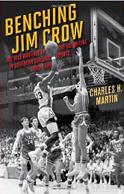Advertisement
Benching Jim Crow
 The dates in the subtitle of Professor Charles Martin's Benching Jim Crow: The Rise and Fall of the Color Line in Southern College Sports, 1890-1980 are a little misleading. The story with which he begins the introduction took place in 1989. It involves Wade Houston, “not only the first African American head coach at Tennessee, but also the first black head coach in any major sport during the fifty-five year history of the SEC.”
The dates in the subtitle of Professor Charles Martin's Benching Jim Crow: The Rise and Fall of the Color Line in Southern College Sports, 1890-1980 are a little misleading. The story with which he begins the introduction took place in 1989. It involves Wade Houston, “not only the first African American head coach at Tennessee, but also the first black head coach in any major sport during the fifty-five year history of the SEC.”Coach Wade’s arrival in Knoxville was celebrated by everybody except the people who ran the Cherokee Country Club, to which Tennessee’s head coaches automatically received memberships. Coach Houston was asked to find somewhere else to play golf and socialize. University officials, previously unaware that the Cherokee Country Club was stuck in some bygone decade, switched their memberships to a club that would admit the new men’s basketball coach.
But most of the stories Professor Martin has to tell involve the arrangements made by schools outside the south to accommodate racist traditions within the region before the southern programs began recruiting black athletes. For decades, schools like Boston College agreed to leave their black players at home when they played southern schools, and the pernicious arrangement ironically labeled “the gentlemen’s agreement” encouraged colleges in the SEC and other conferences to continue practices that should have been scuttled long before the all-white Kentucky team coached by Adolph Rupp lost the national championship game to Don Haskins’s black starting five of Texas Western, now the University of Texas at El Paso, in 1966.
Benching Jim Crow is a powerful indictment of a racist system, much of which has been dismantled by law, social pressure, and the belated recognition by southern coaches and athletic directors that recruiting white athletes exclusively would doom their universities to teams that might aspire to mediocrity on their most optimistic days. But the book is also a reminder of the extent to which people can hate and fear those who differ from them in terms of skin color, language, or national origin. It reminds us of the way those doing the hating can build insane systems of law and tradition to buttress their prejudices, and the way they can cling to those systems despite logic and even self-interest.
That poisonous inclination is, or course, less evident in college basketball and football than it was thirty and forty and fifty years ago, though black men and women are still underrepresented among head coaches and athletic directors. But prejudice is prejudice, whether the victims are black men, Spanish-speaking immigrants, or Muslims. Charles Martin’s account of the history of a particular tradition of bias, fear, and oppression may remind readers of the inclination of some members of our species to construct out of fear and cynical opportunism arbitrary distinctions that burden and damage the most disadvantaged members of the human community, and it may warn those readers against the results of that madness.
This program aired on August 26, 2010. The audio for this program is not available.
